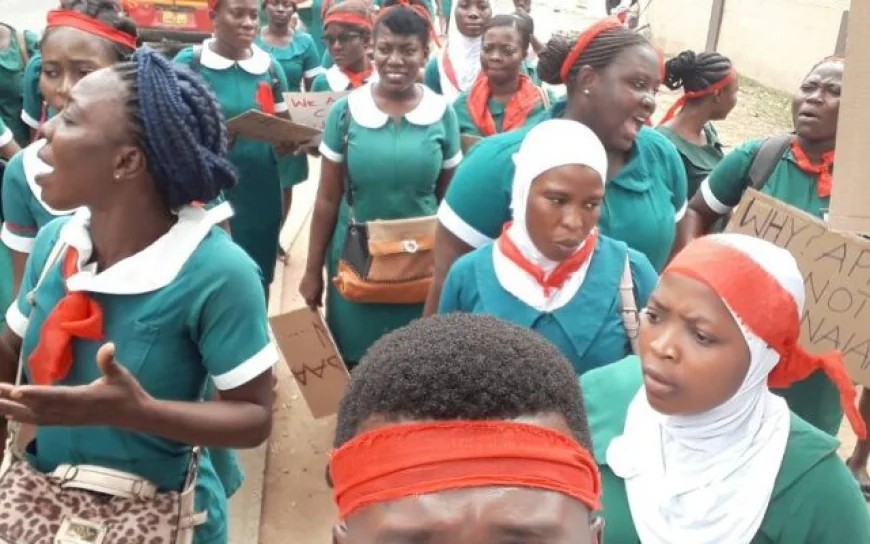Ghana Nurses Strike Day 6: GRNMA Stands Firm on 2024 Agreement, Rejects Renegotiation
As the Ghana nurses and midwives strike enters day six, GRNMA insists on no renegotiation of the 2024 Collective Agreement, urging the government to implement agreed terms.

As the nationwide strike by nurses and midwives enters its sixth day, the Ghana Registered Nurses and Midwives Association (GRNMA) has taken a decisive stance, declaring that it will not entertain any renegotiation of the 2024 Collective Agreement, even as it expresses readiness to engage with the Ministry of Health on other matters.
The industrial action, which began on June 4, stems from the government’s delay in implementing agreed-upon provisions concerning allowances, incentives, and improved working conditions for nurses and midwives. The strike has significantly disrupted public healthcare services, leaving many hospitals operating at minimal capacity.
“We’re Open to Talks, But Not Renegotiation” – GRNMA
Speaking on Citi FM’s Citi Breakfast Show, GRNMA Greater Accra Regional Chairman, Jefferson Asare, made it clear that while the association is open to dialogue, it will not revisit any agreed terms.
“We are ready to meet. If we receive a letter now, we will move anywhere they want us to go. But for renegotiation, we are not ready,” Asare stated.
He criticized the government for its failure to fulfill promises, highlighting that nurses and midwives are the only group within the health sector whose negotiated conditions remain unimplemented.
“In the health ecosystem, it is not only nurses who have problems with the conditions of service. But we are the only group whose conditions of service have not been implemented,” he added.
Health Minister Urges Calm and Dialogue
Health Minister Kwabena Mintah Akandoh has called for calm, emphasizing the need for open dialogue to restore order in the health sector.
“This is a time for dialogue. We must work together to find a common ground for the sake of our patients,” the Minister said over the weekend.
However, the GRNMA has insisted that discussions must focus solely on implementation logistics and timelines — not a re-evaluation of terms that were finalized during the 2024 negotiation cycle.
Hospitals Overwhelmed, Public Concern Mounts
Healthcare facilities across the country continue to suffer the effects of the ongoing strike. Many hospitals report staff shortages, extended patient wait times, and in some cases, the inability to attend to new patients altogether.
The crisis has intensified public concerns about the state of labour relations in the health sector and raised fresh doubts about the government’s commitment to honouring collective agreements.
Civil society organisations and health professionals are urging swift resolution to the impasse, warning that the delay in implementing the agreement threatens not just labour harmony but also patient safety nationwide.
What Lies Ahead
With both sides entrenched in their positions, the nature of any upcoming engagements between the GRNMA and the Ministry of Health will be pivotal. While the government seeks a renegotiated resolution, the GRNMA is standing its ground: the only acceptable way forward is the full implementation of the 2024 Collective Agreement.
Until then, the nation’s already strained health system will continue to suffer — and the cost will be borne by patients across Ghana.


